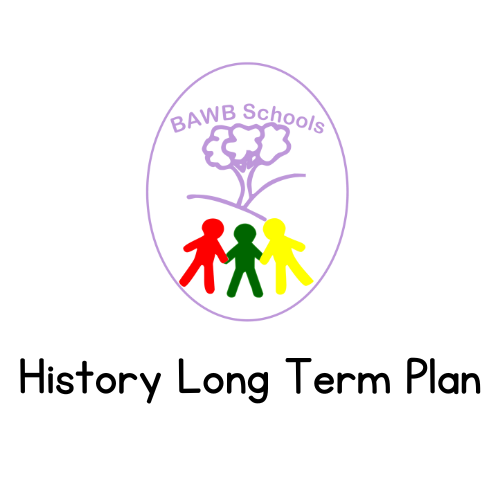Intent
The BAWB Federation history curriculum inspires pupils to be curious and creative thinkers who develop a complex knowledge of local and national history and the history of the wider world. Pupils to develop the confidence to think critically, ask questions, and be able to explain and analyse historical evidence.
We use the Kapow scheme of work, through which pupils build an awareness of significant events and individuals in global, British and local history and recognise how things have changed over time. It supports children to appreciate the complexity of people’s lives, the diversity of societies and the relationships between different groups. It can also help them to appreciate the many reasons why people may behave in the way they do, supporting children to develop empathy for others while providing an opportunity to learn from mankind’s past mistakes.
In order to prepare pupils for their future learning in History, the scheme introduces them to key substantive concepts including power, invasion, settlement and migration, empire, civilisation, religion, trade, achievements of humankind, society and culture.
Implementation
Our History curriculum is delivered through the Kapow Primary History scheme. The Kapow Primary scheme emphasises the importance of historical knowledge being shaped by historical enquiry and disciplinary concepts. Topic knowledge, chronological awareness and substantive concepts are interwoven through all the history units to create engaging and enriching learning experiences which allow the children to investigate history as historians do.
In Key Stage 1 and 2, units are organised around an enquiry-based question and children are encouraged to follow the enquiry cycle (Question, Investigate, Interpret, Evaluate and conclude, Communicate) when answering historical questions.
Over the course of the scheme, children develop their understanding of the following key disciplinary concepts:
- Change and continuity.
- Cause and consequence.
- Similarities and differences.
- Historical significance.
- Historical interpretations.
- Sources of evidence.
These concepts will be encountered in different contexts during the study of local, British and world history, meaning that pupils begin to develop an understanding of these abstract themes which are crucial to their future learning in History. The Kapow scheme follows the spiral curriculum model where previous skills and knowledge are returned to and built upon.
Impact
By the end of their primary career, all of our pupils should leave school equipped with a range of skills to enable them to succeed in their secondary education. They will be enquiring learners who ask questions and can make suggestions about where to find the evidence to answer the question. They will be critical and analytical thinkers who are able to make informed and balanced judgements based on their knowledge of the past.
For more information about our History curriculum, please contact our History Subject Leader:
Mr Matthew Scrafton (based at Askrigg) m.scrafton@b-a-wb.co.uk
